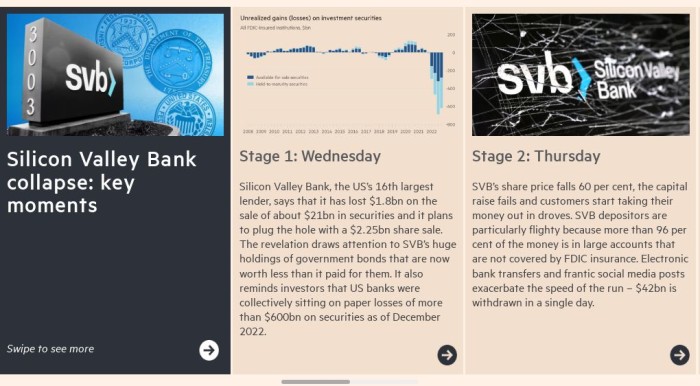[ad_1]
Charles Schwab is battling to allay fears about interest rates and unrealised losses after the brokerage’s shares fell 40 per cent following the collapse of Silicon Valley Bank.
Shares in Schwab, which is the largest brokerage in the US, with $7.4tn in client assets, have fallen further and faster than its rivals, such as Interactive Brokers, in the wake of SVB’s failure.
Schwab’s shares jumped 9.2 per cent on Tuesday after billionaire fund manager Ron Baron “marginally increased” his less than 1 per cent investment in the firm and as US financial stocks surged following promises from regulators to protect depositors.
But investors remain concerned about the broker’s unrealised losses on assets such as Treasuries and mortgage-backed securities — which were close to $28bn at the end of 2022.
The rapid collapse of SVB has focused attention on the risks of having to sell assets at a markdown in a rising-interest rate environment. It also caught groups such as Schwab off guard at a point when they are already under pressure from customers reacting to higher rates.
“Schwab hasn’t been hit by people afraid that Schwab is going to go out of business, but they’ve been hit by [customers] going to higher rates,” said Richard Repetto, an analyst at Piper Sandler.
Rather than lending out client funds, Schwab automatically “sweeps” customer cash deposits into bank accounts and invests those assets into secure, long-dated securities.
Cash has surged into Schwab since the start of the coronavirus pandemic. By the end of February 2023, it held more than $500bn in interest-earning cash deposits on its platform, down 20 per cent from the end of 2021.
But rising interest rates have pushed investors to move cash into better yielding accounts, such as money market funds. The shift, called “cash sorting”, has resulted in about $43bn moving out of Schwab cash accounts in the fourth quarter of 2022, according to Piper Sandler.
Inflows into money market funds at Schwab averaged $1.4bn a day in the first week of March, according to JPMorgan.
The rate of cash sorting will probably exceed the rate of the maturing assets held by Schwab’s bank — only about $32bn are expected to mature this year, according to JPMorgan.
In order to fund the withdrawals into money market accounts, Schwab has had to borrow money at a higher cost, such as from the Federal Home Loan Banks, which will probably continue and hit the broker’s bottom line, analysts said. UBS expects Schwab earnings in 2023 to fall 20 per cent from 2022 because of the increased cost of borrowing.
“It’s a real headwind,” said Brennan Hawken, an analyst at UBS. He added that because this information was made available last month, the recent sell-off was likely down to frightened investors cutting banks with large unrealised losses out of their portfolios.
The broker on Monday issued a statement following a release of flows data from February, emphasising that 80 per cent of the company’s bank deposits were within the Federal Deposit Insurance Corporation insurable limit.
“Looking at unrealised losses among [held to maturity] securities, but not doing the same for traditional banks’ loan portfolios, the analysis penalises firms like Schwab that in fact have a higher quality, more liquid, and more transparent balance sheet,” Schwab said in a statement.
Outflows of Schwab’s cash deposits have been ongoing since April 2022, after the Federal Reserve began raising interest rates, before intensifying in the past week. Schwab said it believed it was nearing the end of the majority of customers sorting their cash into money market funds.
In late January, Peter Crawford, Schwab’s chief financial officer, said it was “entering the later innings” of the flows from cash deposits to money market accounts, on which it charges fees, and expected it to abate by the end of the year.
Most brokerages have sweep accounts, but Schwab is the largest broker, with a relatively affluent customer base. It has the largest average account size of any brokerage of its size, at more than $200,000, according to data from BrokerChooser.
But Schwab’s investor base was more diversified, and less likely to move at the scale that SVB’s did, said Repetto at Piper Sandler. “They’re not Silicon Valley investors or companies, they’re the little guy putting money in.”
[ad_2]
Source link


